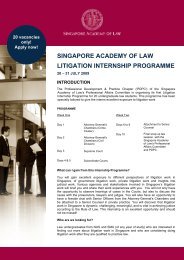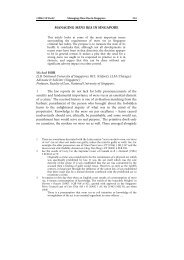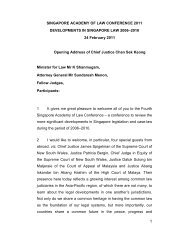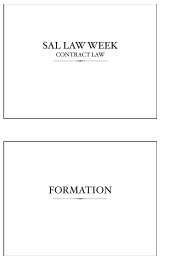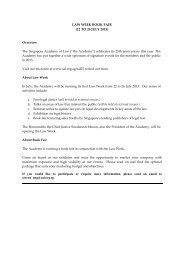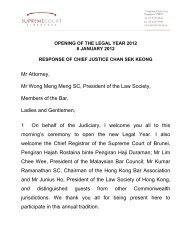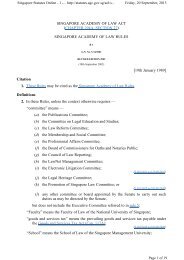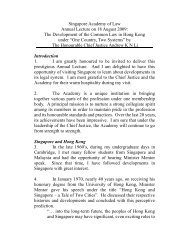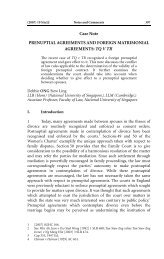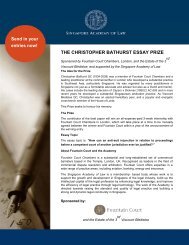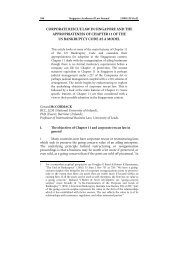View Article - Singapore Academy of Law
View Article - Singapore Academy of Law
View Article - Singapore Academy of Law
You also want an ePaper? Increase the reach of your titles
YUMPU automatically turns print PDFs into web optimized ePapers that Google loves.
15 SAcLJ Matrimonial Assets and the 3 rd Party 297<br />
It will not be possible to transfer ancillary matters pending in the High<br />
Court to the Family Court, as the originating process would be a petition<br />
and not a writ <strong>of</strong> summons. In this regard, other types <strong>of</strong> actions such as<br />
bankruptcy, companies’ winding up actions and probate matters, which<br />
are commenced by petitions, may also not be transferred from the High<br />
Court to the Family Court.<br />
(b)<br />
Proceedings commenced under specific legislation only giving<br />
jurisdiction to High Court<br />
211 It is further submitted that if the High Court proceedings were<br />
commenced under specific legislation only giving jurisdiction to the<br />
High Court (for example, an application taken out under Section 73B <strong>of</strong><br />
the Conveyancing and <strong>Law</strong> <strong>of</strong> Property Act (Cap. 61) 130 (as was done in<br />
the case <strong>of</strong> Soh Lai Chan, supra)) such proceedings would fall outside<br />
the scope <strong>of</strong> Section 37. The High Court would therefore not have the<br />
power to transfer the case down to the District Court. The rationale for<br />
this is that if Parliament has expressly given the jurisdiction over cases<br />
coming under the specific legislation to the High Court alone, the courts<br />
should not go against Parliament’s intention by transferring such cases to<br />
the District Court under Section 37.<br />
212 This argument is reinforced by the fact that there is already a<br />
specific legislative mechanism for the District Court to be conferred<br />
jurisdiction to deal with certain classes <strong>of</strong> cases that only the High Court<br />
would have had jurisdiction to deal with. Under Section 28A (Allocation<br />
<strong>of</strong> proceedings to District Court) <strong>of</strong> the SCJA, the Chief Justice may by<br />
order direct certain classes <strong>of</strong> cases commenced in the High Court to be<br />
heard by the District Court, and confer jurisdiction on the District Court<br />
to do so. 131 (The Transfer Order and the Second Transfer Order, which<br />
130 The term “court” in the Act is defined as “High Court”—see Section 2(Interpretation)<br />
<strong>of</strong> the said Act.<br />
131 Section 28A SCJA states:<br />
(1) The Chief Justice may, where he considers it necessary or expedient to improve<br />
efficiency in the administration <strong>of</strong> justice and to provide for more speedy disposal <strong>of</strong><br />
proceedings commenced in the High Court, by order direct such class or classes or<br />
description <strong>of</strong> proceedings as may be specified in the order to be heard and<br />
determined by the District Court.<br />
(2) Notwithstanding any other written law, any order under subsection (1) —<br />
(a) may confer jurisdiction on a District Court to hear and determine —<br />
(i) any proceedings specified in the order which, but for the order, the District Court<br />
would not have jurisdiction to hear and determine by reason only <strong>of</strong> the fact that the<br />
amount involved exceeds the monetary limit <strong>of</strong> its jurisdiction; or<br />
(ii) any proceedings relating to any <strong>of</strong> the ma tters referred to in [continued next page]



